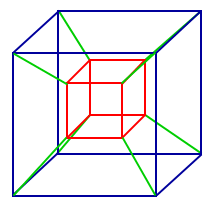Are there any real numbers that are NOT algebraic, i.e., expressible as the root of a non-zero polynomial with integer coefficients?
In fact, not only are there infinitely many, there uncountably many transcendental numbers, as they are called. This may be seen by noting there are only countably many polynomials with integer coefficients (each having finitely many roots), but there are uncountably many real numbers. But finding an explicit example of such a number is not easy!
Here is one such number, called a Liouville number—it has a decimal expansion with a 1 in every factorial-numbered position, and 0 in every other position:L = 0.110001000000000000000001000000…
So it is the infinite sum of 10-n! for positive whole numbers n.
What a crazy number!
The Math Behind the Fact:
We can sketch why this Liouville number L can’t be the root of a polynomial p(x) with integer coefficients. For the sake of an example, suppose p(x) is a cubic polynomial.
In the infinite sum expression for L, let Ln be the n-th partial sum, e.g., Ln truncates L at the n!-th decimal place.
Now write p(x)=f(x)-g(x) where f and g have only non-negative coefficients. As f(x) is at most a cubic, write L=Ln+E. Note that Ln terminates after the n!-th decimal place, but E is approximately 10-(n+1)!. So the cube of L3, which terminates after (3n!) places, will not interact with E in its decimal expansion. So choose n large enough (bigger than N, say) so that the coefficients of f(x) will not cause Ln and E to interact.
Thus f(L) will agree with f(Ln) on its first 3n! digits. And a similar situation holds for g(L) and g(Ln). Thus if p(L) were 0, then f(L)=g(L), and since they agree on their first 3n! digits, we’d see f(Ln)=g(Ln) for every n > N.
But that would imply that p(x)=f(x)-g(x) has infinitely many roots, a contradiction, as it is was a non-zero polynomial!
Liouville found the first transcendental number in 1844. The first non-contrived demonstration of a transcendental number was Lindemann’s 1882 proof that Pi is transcendental.
How to Cite this Page:
Su, Francis E., et al. “Liouville Numbers.” Math Fun Facts. <http://www.math.hmc.edu/funfacts>.
References:
Conway and Guy, The Book of Numbers, p.240.
Fun Fact suggested by:
Francis Su

